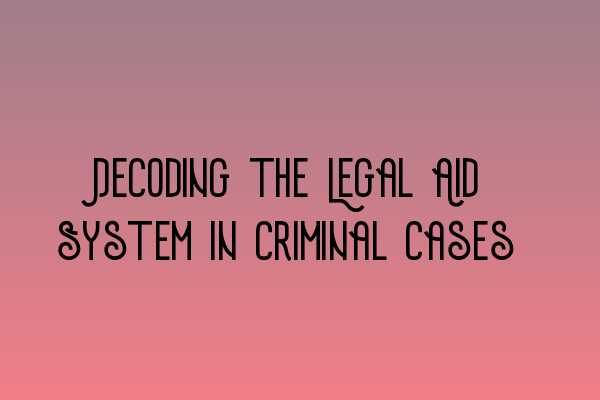Decoding the Legal Aid System in Criminal Cases
Legal aid plays a crucial role in ensuring access to justice for all individuals, regardless of their financial status. In criminal cases, where the stakes are high and the consequences significant, legal aid becomes even more important. Understanding the legal aid system is essential for both solicitors and clients to navigate the complexities of criminal law proceedings.
What is Legal Aid?
Legal aid is a government-funded program that provides free legal assistance to individuals who cannot afford to pay for legal representation. It aims to ensure that everyone has equal access to the law and can exercise their right to a fair trial.
In criminal cases, legal aid covers the costs of solicitors, barristers, and other legal professionals who represent defendants. It also covers expenses related to investigations, gathering evidence, and expert witnesses.
Eligibility for Legal Aid
To qualify for legal aid in criminal cases, individuals must meet certain criteria set by the Legal Aid Agency. The eligibility is based on two factors: means testing and the interests of justice.
Means testing evaluates an individual’s financial situation, including their income, savings, and assets. Those with a disposable income above a certain threshold may have to contribute towards their legal costs or pay for the services privately.
The interests of justice criterion considers the seriousness of the offense, potential imprisonment, and the complexities of the case. If the case meets the requirements for legal aid, it will be granted irrespective of the individual’s financial situation.
For a more detailed understanding of the eligibility criteria, you can refer to the SQE 1 Practice Mocks FLK1 FLK2 article, which outlines the specific requirements necessary to qualify for legal aid.
Applying for Legal Aid
Applying for legal aid in criminal cases can be a complex and time-consuming process. It involves completing a detailed application form and providing supporting documents to prove eligibility.
It is crucial to fill out the application accurately and comprehensively to improve the chances of success. Any incorrect or missing information can result in delays or even a rejection of the application.
If you are preparing for the SQE 1 exam and want to test your knowledge about legal aid applications, you can visit the SQE 1 Practice Exam Questions article, which provides practice questions to help you prepare effectively.
Types of Legal Aid Representation
Legal aid provides different levels of representation based on the seriousness and complexity of the case. These include:
- Advice and Assistance: This covers initial legal advice, assistance with police interviews, and general guidance.
- Representation at Magistrates’ Court: This involves representation in the lower court for less serious offenses.
- Representation in Crown Court: For more serious offenses, legal aid covers representation in the higher court.
- Non-Means Tested Representation: In exceptional cases, legal aid may be granted without means testing.
If you want to delve deeper into the different types of legal aid representation available, the SQE 2 Preparation Courses article offers comprehensive information to enhance your knowledge in this area.
The Challenges of Legal Aid System in Criminal Cases
While legal aid is a vital resource, it faces challenges that impact its effectiveness in criminal cases.
One of the main challenges is funding. Limited government funding often leads to a shortage of legal aid providers, causing delays in the legal process and potentially compromising the quality of representation.
Increasing awareness about the importance of legal aid and the need for adequate funding is crucial for addressing these challenges and ensuring access to justice for all.
Conclusion
Understanding the legal aid system in criminal cases is essential for both solicitors and individuals seeking representation. It ensures that access to justice is not limited by financial constraints and helps maintain fairness in criminal proceedings.
For more information about the SQE exam and important dates, you can refer to the SRA SQE Exam Dates article.
Decoding the legal aid system empowers both legal professionals and individuals, allowing them to navigate the complex landscape of criminal law with confidence.
